Hospitality Business Toolkit: Financial, HR, and Legal Aspects
VerifiedAdded on 2020/10/22
|13
|3935
|424
Report
AI Summary
This report provides a comprehensive overview of a Hospitality Business Toolkit, using Carnival Corporation as a case study. It delves into managing and monitoring financial performance, including financial statements and competitive analysis. The report details the double-entry system, journal entries, ledger accounts, and trial balance preparation. It further explores the HR life cycle, encompassing recruitment, education, motivation, evaluation, and celebration, alongside a performance management plan. The report also examines relevant legislation, employment and contract law, functional roles within the hospitality sector, and communication strategies. The analysis covers financial transactions, HR practices, legal considerations, and operational aspects, offering a holistic understanding of the hospitality industry's key components.
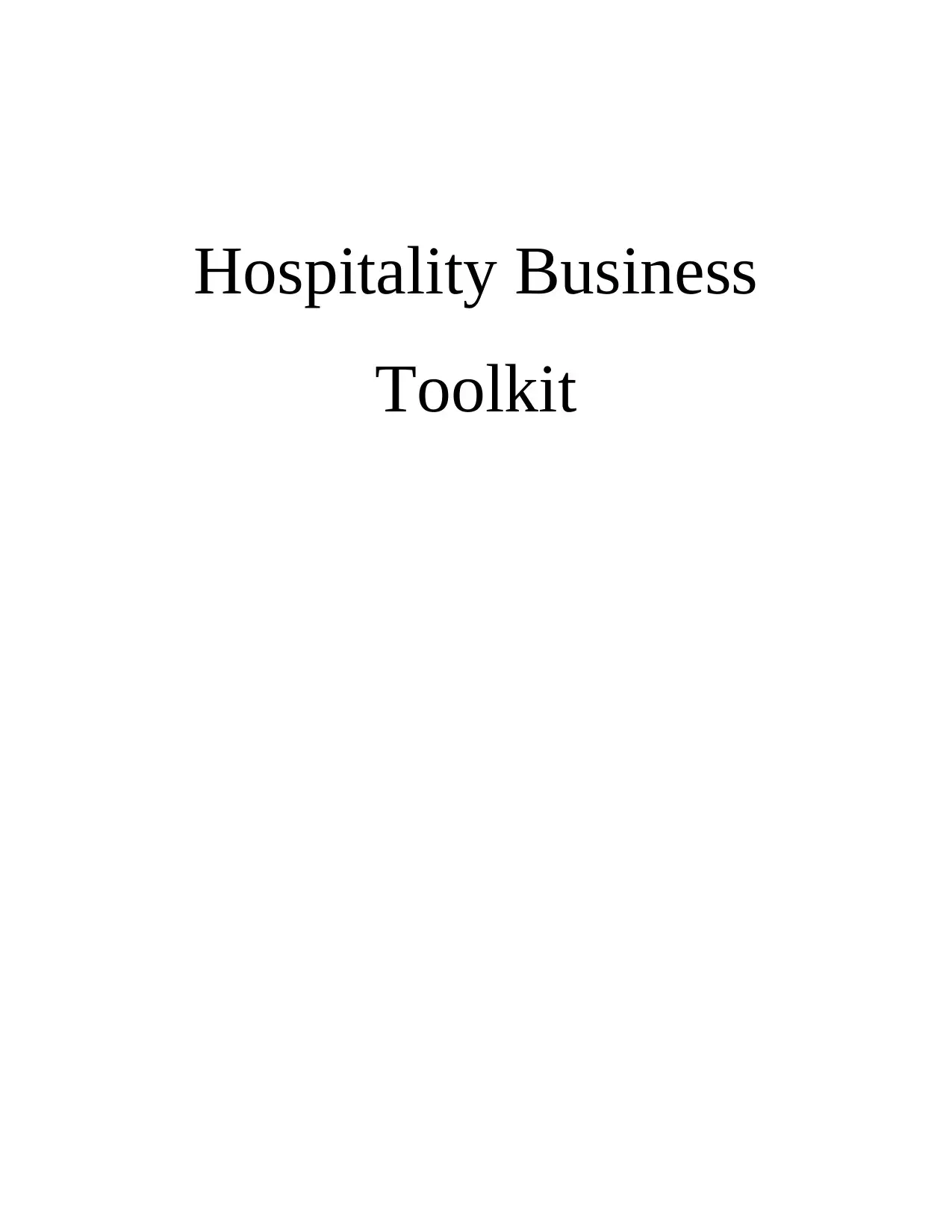
Hospitality Business
Toolkit
Toolkit
Paraphrase This Document
Need a fresh take? Get an instant paraphrase of this document with our AI Paraphraser
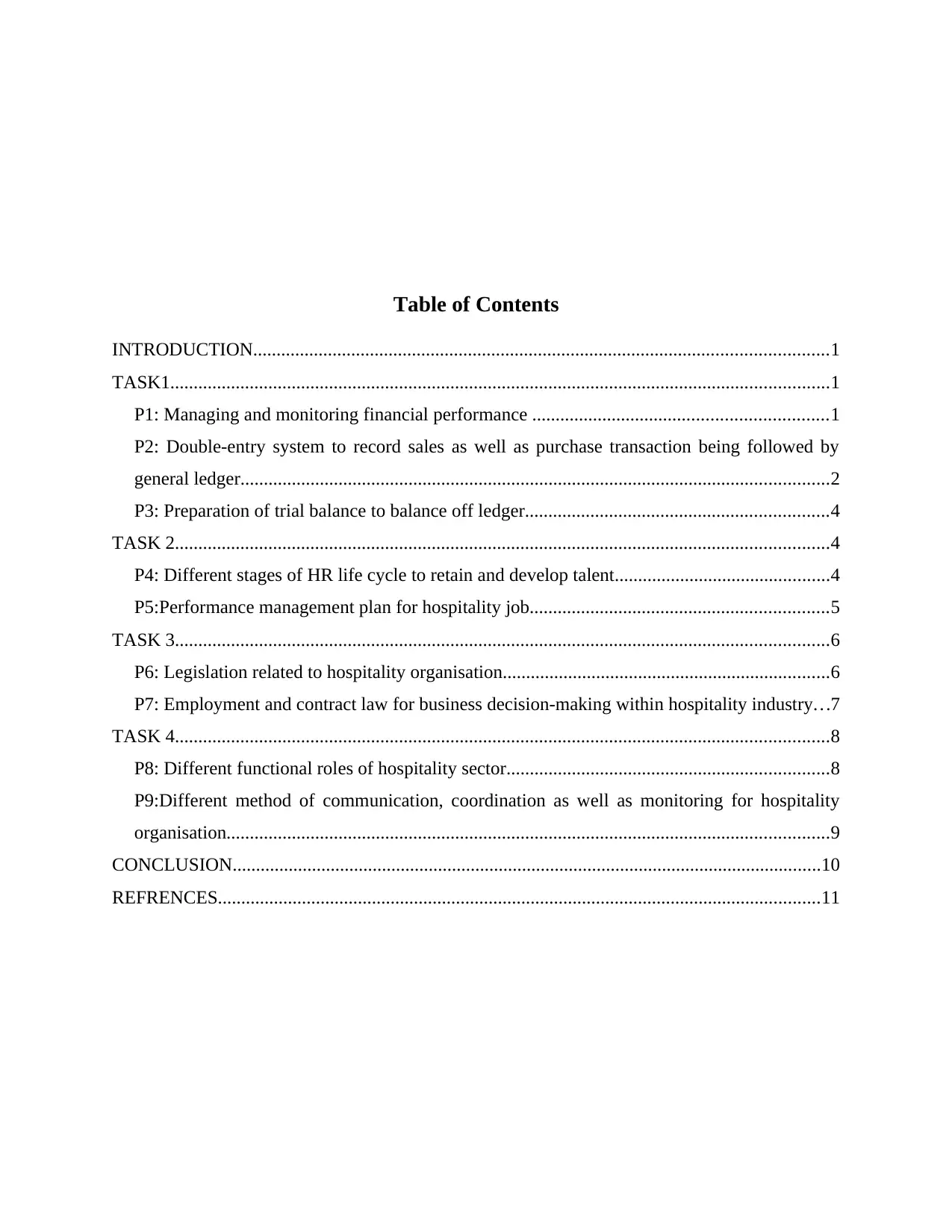
Table of Contents
INTRODUCTION...........................................................................................................................1
TASK1.............................................................................................................................................1
P1: Managing and monitoring financial performance ...............................................................1
P2: Double-entry system to record sales as well as purchase transaction being followed by
general ledger..............................................................................................................................2
P3: Preparation of trial balance to balance off ledger.................................................................4
TASK 2............................................................................................................................................4
P4: Different stages of HR life cycle to retain and develop talent..............................................4
P5:Performance management plan for hospitality job................................................................5
TASK 3............................................................................................................................................6
P6: Legislation related to hospitality organisation......................................................................6
P7: Employment and contract law for business decision-making within hospitality industry...7
TASK 4............................................................................................................................................8
P8: Different functional roles of hospitality sector.....................................................................8
P9:Different method of communication, coordination as well as monitoring for hospitality
organisation.................................................................................................................................9
CONCLUSION..............................................................................................................................10
REFRENCES.................................................................................................................................11
INTRODUCTION...........................................................................................................................1
TASK1.............................................................................................................................................1
P1: Managing and monitoring financial performance ...............................................................1
P2: Double-entry system to record sales as well as purchase transaction being followed by
general ledger..............................................................................................................................2
P3: Preparation of trial balance to balance off ledger.................................................................4
TASK 2............................................................................................................................................4
P4: Different stages of HR life cycle to retain and develop talent..............................................4
P5:Performance management plan for hospitality job................................................................5
TASK 3............................................................................................................................................6
P6: Legislation related to hospitality organisation......................................................................6
P7: Employment and contract law for business decision-making within hospitality industry...7
TASK 4............................................................................................................................................8
P8: Different functional roles of hospitality sector.....................................................................8
P9:Different method of communication, coordination as well as monitoring for hospitality
organisation.................................................................................................................................9
CONCLUSION..............................................................................................................................10
REFRENCES.................................................................................................................................11
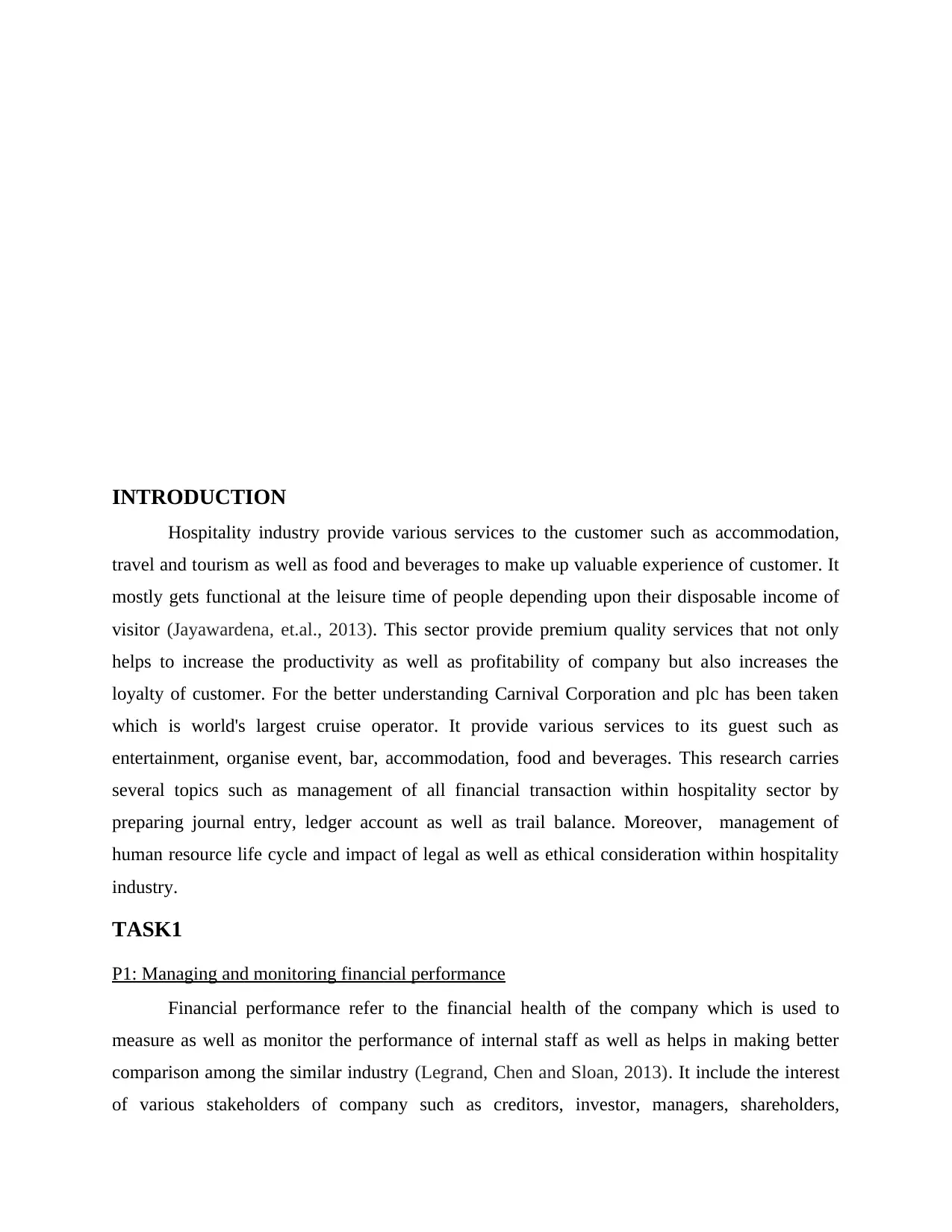
INTRODUCTION
Hospitality industry provide various services to the customer such as accommodation,
travel and tourism as well as food and beverages to make up valuable experience of customer. It
mostly gets functional at the leisure time of people depending upon their disposable income of
visitor (Jayawardena, et.al., 2013). This sector provide premium quality services that not only
helps to increase the productivity as well as profitability of company but also increases the
loyalty of customer. For the better understanding Carnival Corporation and plc has been taken
which is world's largest cruise operator. It provide various services to its guest such as
entertainment, organise event, bar, accommodation, food and beverages. This research carries
several topics such as management of all financial transaction within hospitality sector by
preparing journal entry, ledger account as well as trail balance. Moreover, management of
human resource life cycle and impact of legal as well as ethical consideration within hospitality
industry.
TASK1
P1: Managing and monitoring financial performance
Financial performance refer to the financial health of the company which is used to
measure as well as monitor the performance of internal staff as well as helps in making better
comparison among the similar industry (Legrand, Chen and Sloan, 2013). It include the interest
of various stakeholders of company such as creditors, investor, managers, shareholders,
Hospitality industry provide various services to the customer such as accommodation,
travel and tourism as well as food and beverages to make up valuable experience of customer. It
mostly gets functional at the leisure time of people depending upon their disposable income of
visitor (Jayawardena, et.al., 2013). This sector provide premium quality services that not only
helps to increase the productivity as well as profitability of company but also increases the
loyalty of customer. For the better understanding Carnival Corporation and plc has been taken
which is world's largest cruise operator. It provide various services to its guest such as
entertainment, organise event, bar, accommodation, food and beverages. This research carries
several topics such as management of all financial transaction within hospitality sector by
preparing journal entry, ledger account as well as trail balance. Moreover, management of
human resource life cycle and impact of legal as well as ethical consideration within hospitality
industry.
TASK1
P1: Managing and monitoring financial performance
Financial performance refer to the financial health of the company which is used to
measure as well as monitor the performance of internal staff as well as helps in making better
comparison among the similar industry (Legrand, Chen and Sloan, 2013). It include the interest
of various stakeholders of company such as creditors, investor, managers, shareholders,
⊘ This is a preview!⊘
Do you want full access?
Subscribe today to unlock all pages.

Trusted by 1+ million students worldwide
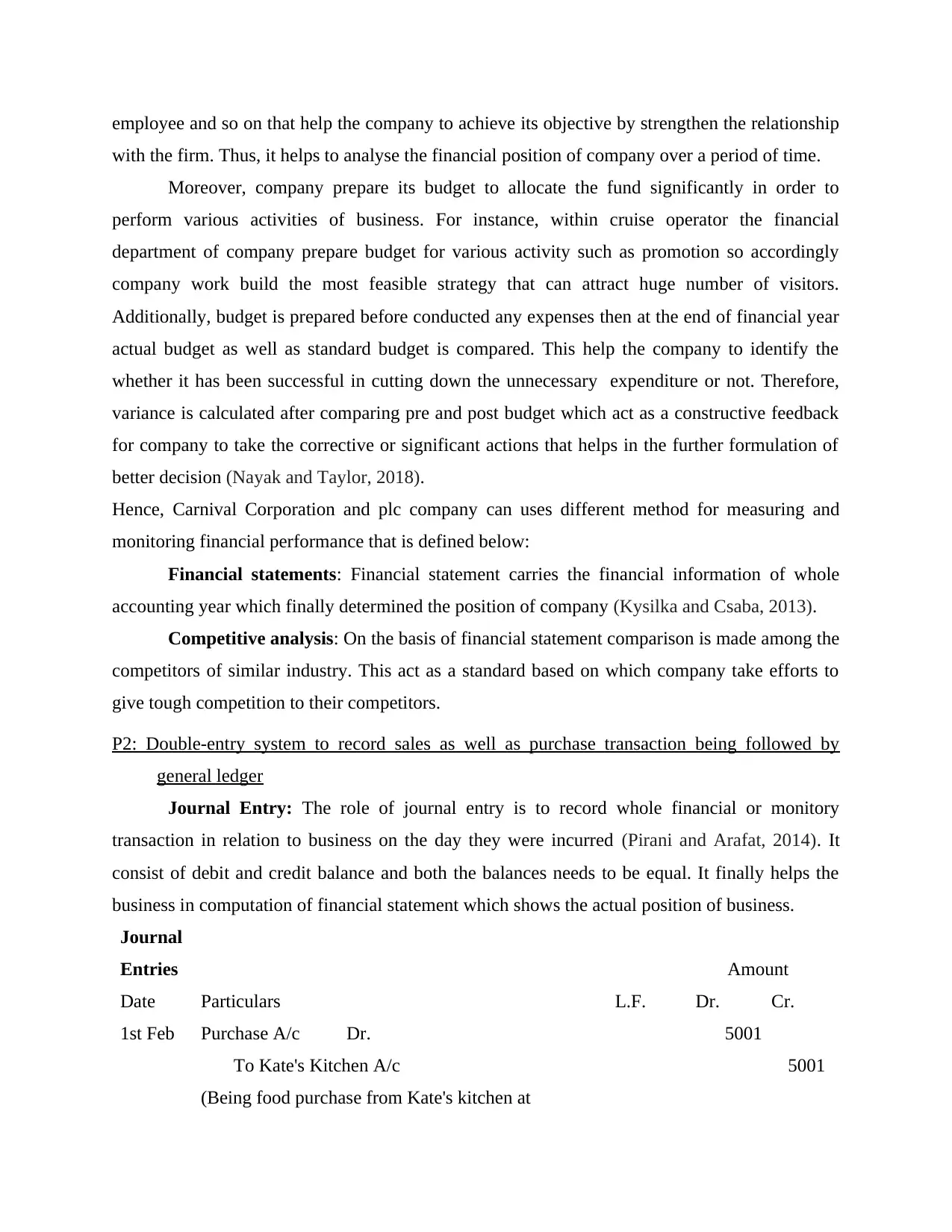
employee and so on that help the company to achieve its objective by strengthen the relationship
with the firm. Thus, it helps to analyse the financial position of company over a period of time.
Moreover, company prepare its budget to allocate the fund significantly in order to
perform various activities of business. For instance, within cruise operator the financial
department of company prepare budget for various activity such as promotion so accordingly
company work build the most feasible strategy that can attract huge number of visitors.
Additionally, budget is prepared before conducted any expenses then at the end of financial year
actual budget as well as standard budget is compared. This help the company to identify the
whether it has been successful in cutting down the unnecessary expenditure or not. Therefore,
variance is calculated after comparing pre and post budget which act as a constructive feedback
for company to take the corrective or significant actions that helps in the further formulation of
better decision (Nayak and Taylor, 2018).
Hence, Carnival Corporation and plc company can uses different method for measuring and
monitoring financial performance that is defined below:
Financial statements: Financial statement carries the financial information of whole
accounting year which finally determined the position of company (Kysilka and Csaba, 2013).
Competitive analysis: On the basis of financial statement comparison is made among the
competitors of similar industry. This act as a standard based on which company take efforts to
give tough competition to their competitors.
P2: Double-entry system to record sales as well as purchase transaction being followed by
general ledger
Journal Entry: The role of journal entry is to record whole financial or monitory
transaction in relation to business on the day they were incurred (Pirani and Arafat, 2014). It
consist of debit and credit balance and both the balances needs to be equal. It finally helps the
business in computation of financial statement which shows the actual position of business.
Journal
Entries Amount
Date Particulars L.F. Dr. Cr.
1st Feb Purchase A/c Dr. 5001
To Kate's Kitchen A/c 5001
(Being food purchase from Kate's kitchen at
with the firm. Thus, it helps to analyse the financial position of company over a period of time.
Moreover, company prepare its budget to allocate the fund significantly in order to
perform various activities of business. For instance, within cruise operator the financial
department of company prepare budget for various activity such as promotion so accordingly
company work build the most feasible strategy that can attract huge number of visitors.
Additionally, budget is prepared before conducted any expenses then at the end of financial year
actual budget as well as standard budget is compared. This help the company to identify the
whether it has been successful in cutting down the unnecessary expenditure or not. Therefore,
variance is calculated after comparing pre and post budget which act as a constructive feedback
for company to take the corrective or significant actions that helps in the further formulation of
better decision (Nayak and Taylor, 2018).
Hence, Carnival Corporation and plc company can uses different method for measuring and
monitoring financial performance that is defined below:
Financial statements: Financial statement carries the financial information of whole
accounting year which finally determined the position of company (Kysilka and Csaba, 2013).
Competitive analysis: On the basis of financial statement comparison is made among the
competitors of similar industry. This act as a standard based on which company take efforts to
give tough competition to their competitors.
P2: Double-entry system to record sales as well as purchase transaction being followed by
general ledger
Journal Entry: The role of journal entry is to record whole financial or monitory
transaction in relation to business on the day they were incurred (Pirani and Arafat, 2014). It
consist of debit and credit balance and both the balances needs to be equal. It finally helps the
business in computation of financial statement which shows the actual position of business.
Journal
Entries Amount
Date Particulars L.F. Dr. Cr.
1st Feb Purchase A/c Dr. 5001
To Kate's Kitchen A/c 5001
(Being food purchase from Kate's kitchen at
Paraphrase This Document
Need a fresh take? Get an instant paraphrase of this document with our AI Paraphraser
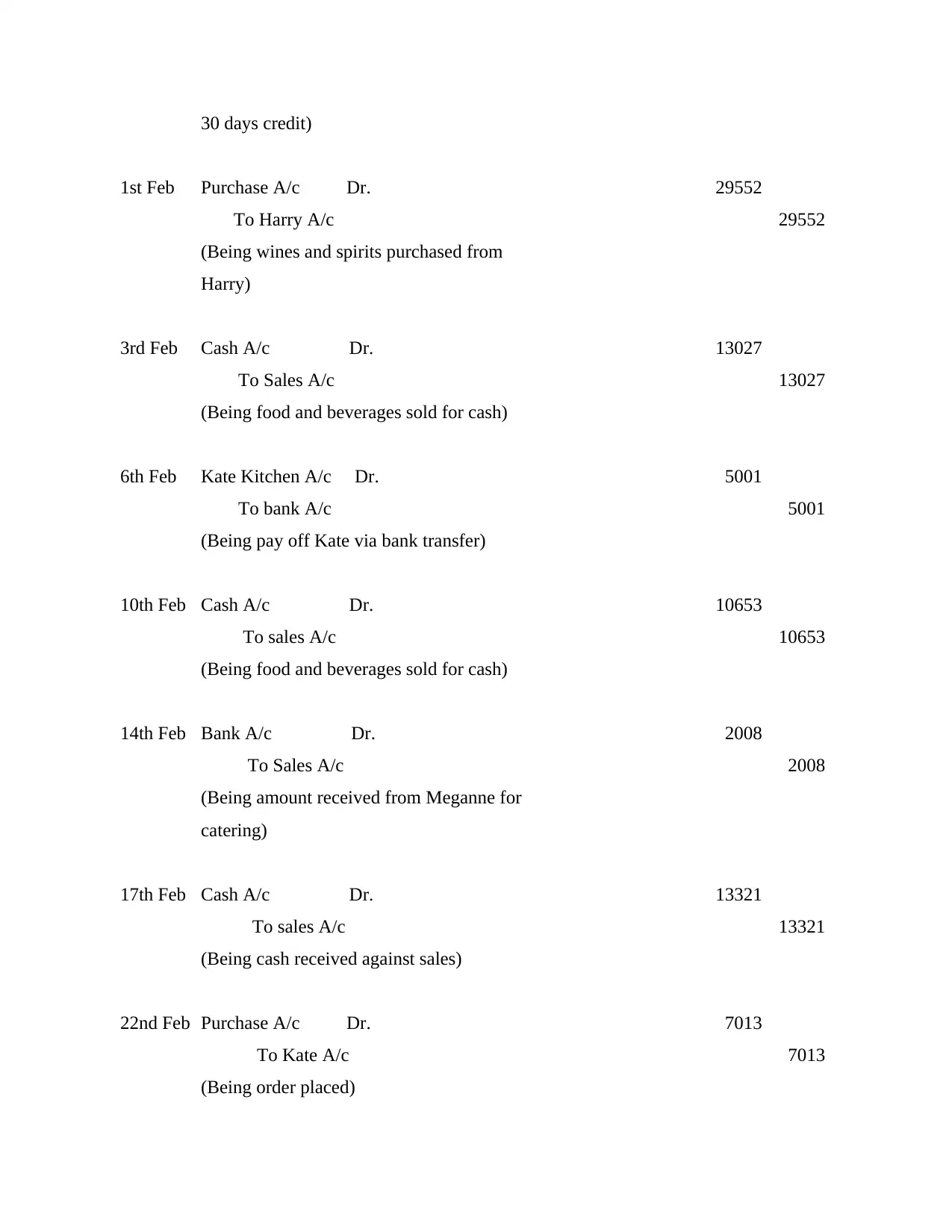
30 days credit)
1st Feb Purchase A/c Dr. 29552
To Harry A/c 29552
(Being wines and spirits purchased from
Harry)
3rd Feb Cash A/c Dr. 13027
To Sales A/c 13027
(Being food and beverages sold for cash)
6th Feb Kate Kitchen A/c Dr. 5001
To bank A/c 5001
(Being pay off Kate via bank transfer)
10th Feb Cash A/c Dr. 10653
To sales A/c 10653
(Being food and beverages sold for cash)
14th Feb Bank A/c Dr. 2008
To Sales A/c 2008
(Being amount received from Meganne for
catering)
17th Feb Cash A/c Dr. 13321
To sales A/c 13321
(Being cash received against sales)
22nd Feb Purchase A/c Dr. 7013
To Kate A/c 7013
(Being order placed)
1st Feb Purchase A/c Dr. 29552
To Harry A/c 29552
(Being wines and spirits purchased from
Harry)
3rd Feb Cash A/c Dr. 13027
To Sales A/c 13027
(Being food and beverages sold for cash)
6th Feb Kate Kitchen A/c Dr. 5001
To bank A/c 5001
(Being pay off Kate via bank transfer)
10th Feb Cash A/c Dr. 10653
To sales A/c 10653
(Being food and beverages sold for cash)
14th Feb Bank A/c Dr. 2008
To Sales A/c 2008
(Being amount received from Meganne for
catering)
17th Feb Cash A/c Dr. 13321
To sales A/c 13321
(Being cash received against sales)
22nd Feb Purchase A/c Dr. 7013
To Kate A/c 7013
(Being order placed)
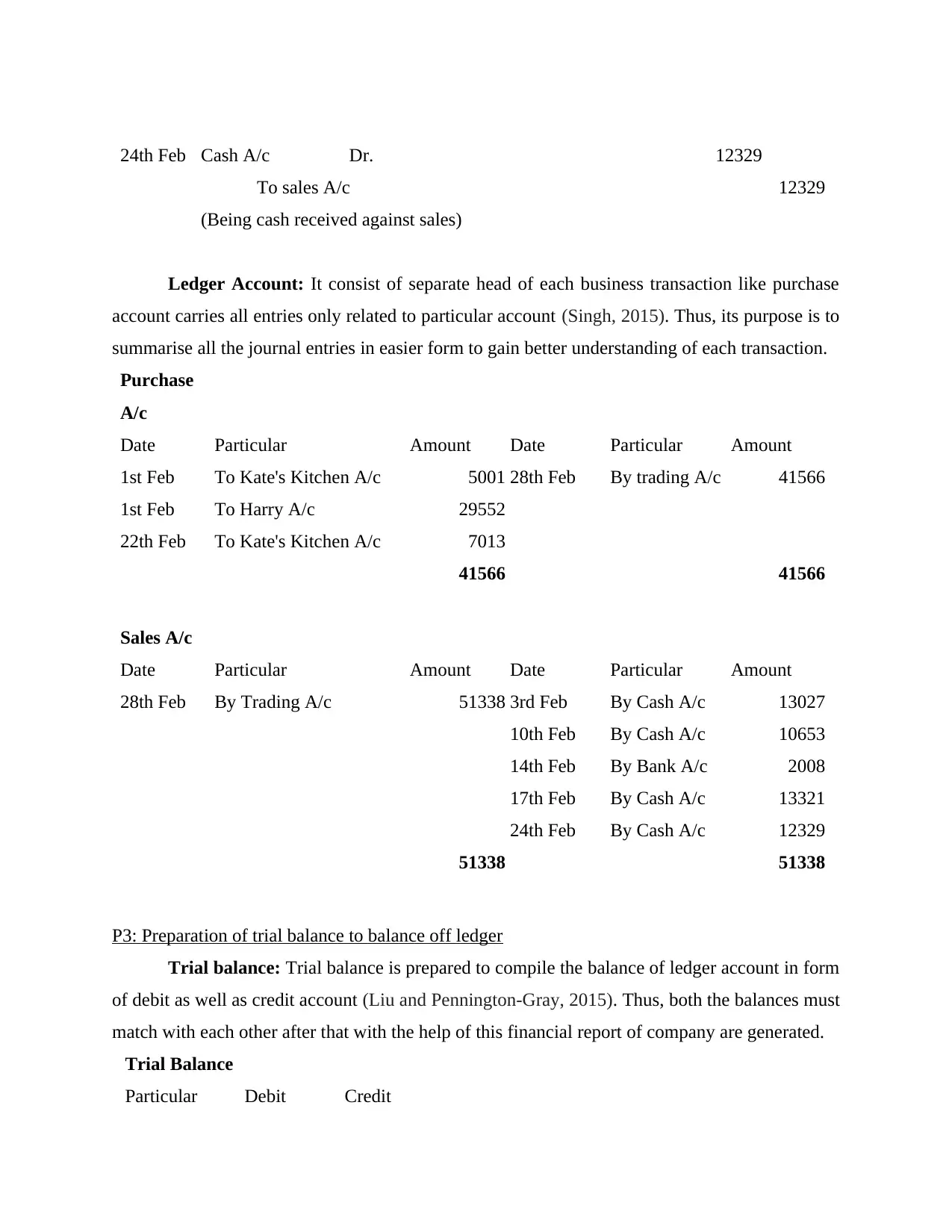
24th Feb Cash A/c Dr. 12329
To sales A/c 12329
(Being cash received against sales)
Ledger Account: It consist of separate head of each business transaction like purchase
account carries all entries only related to particular account (Singh, 2015). Thus, its purpose is to
summarise all the journal entries in easier form to gain better understanding of each transaction.
Purchase
A/c
Date Particular Amount Date Particular Amount
1st Feb To Kate's Kitchen A/c 5001 28th Feb By trading A/c 41566
1st Feb To Harry A/c 29552
22th Feb To Kate's Kitchen A/c 7013
41566 41566
Sales A/c
Date Particular Amount Date Particular Amount
28th Feb By Trading A/c 51338 3rd Feb By Cash A/c 13027
10th Feb By Cash A/c 10653
14th Feb By Bank A/c 2008
17th Feb By Cash A/c 13321
24th Feb By Cash A/c 12329
51338 51338
P3: Preparation of trial balance to balance off ledger
Trial balance: Trial balance is prepared to compile the balance of ledger account in form
of debit as well as credit account (Liu and Pennington-Gray, 2015). Thus, both the balances must
match with each other after that with the help of this financial report of company are generated.
Trial Balance
Particular Debit Credit
To sales A/c 12329
(Being cash received against sales)
Ledger Account: It consist of separate head of each business transaction like purchase
account carries all entries only related to particular account (Singh, 2015). Thus, its purpose is to
summarise all the journal entries in easier form to gain better understanding of each transaction.
Purchase
A/c
Date Particular Amount Date Particular Amount
1st Feb To Kate's Kitchen A/c 5001 28th Feb By trading A/c 41566
1st Feb To Harry A/c 29552
22th Feb To Kate's Kitchen A/c 7013
41566 41566
Sales A/c
Date Particular Amount Date Particular Amount
28th Feb By Trading A/c 51338 3rd Feb By Cash A/c 13027
10th Feb By Cash A/c 10653
14th Feb By Bank A/c 2008
17th Feb By Cash A/c 13321
24th Feb By Cash A/c 12329
51338 51338
P3: Preparation of trial balance to balance off ledger
Trial balance: Trial balance is prepared to compile the balance of ledger account in form
of debit as well as credit account (Liu and Pennington-Gray, 2015). Thus, both the balances must
match with each other after that with the help of this financial report of company are generated.
Trial Balance
Particular Debit Credit
⊘ This is a preview!⊘
Do you want full access?
Subscribe today to unlock all pages.

Trusted by 1+ million students worldwide
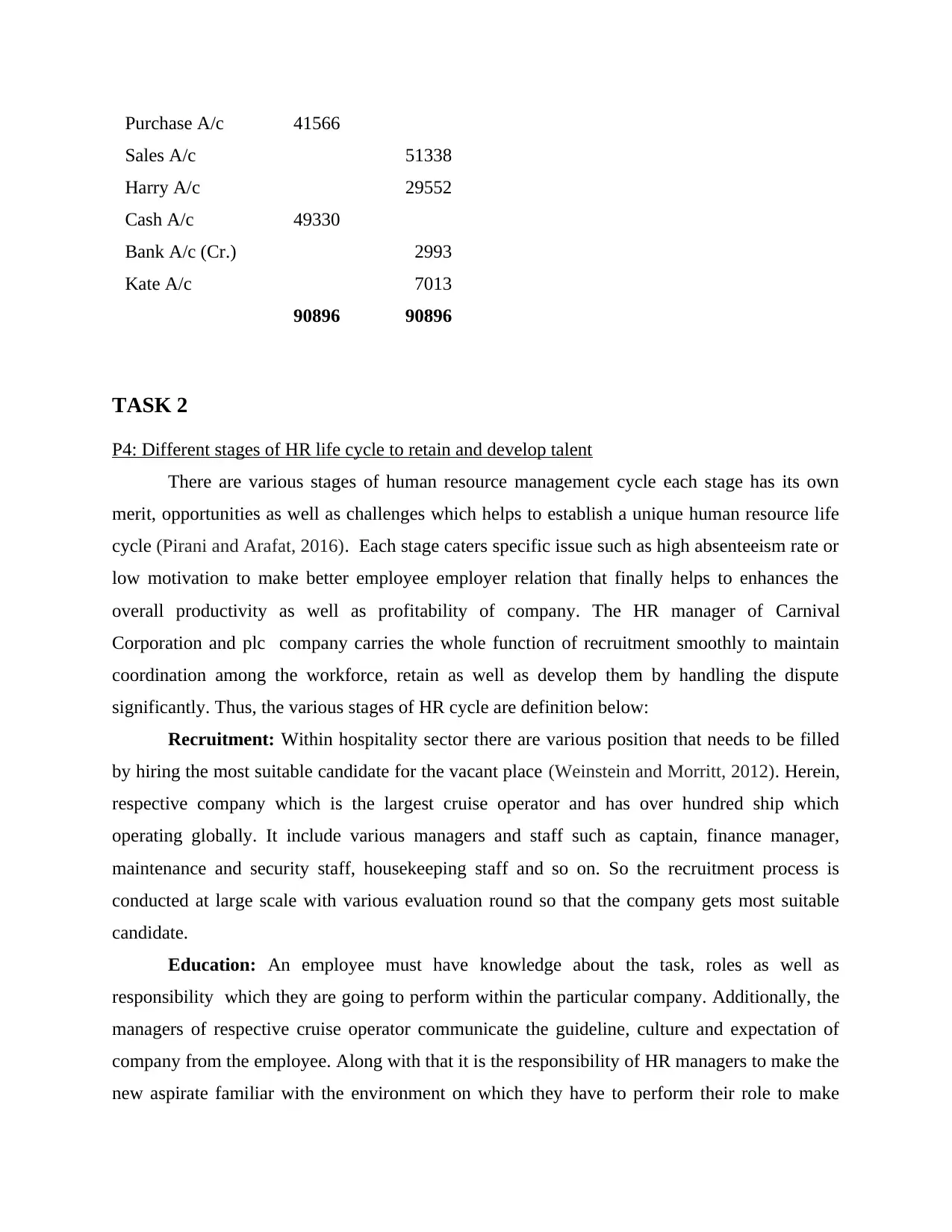
Purchase A/c 41566
Sales A/c 51338
Harry A/c 29552
Cash A/c 49330
Bank A/c (Cr.) 2993
Kate A/c 7013
90896 90896
TASK 2
P4: Different stages of HR life cycle to retain and develop talent
There are various stages of human resource management cycle each stage has its own
merit, opportunities as well as challenges which helps to establish a unique human resource life
cycle (Pirani and Arafat, 2016). Each stage caters specific issue such as high absenteeism rate or
low motivation to make better employee employer relation that finally helps to enhances the
overall productivity as well as profitability of company. The HR manager of Carnival
Corporation and plc company carries the whole function of recruitment smoothly to maintain
coordination among the workforce, retain as well as develop them by handling the dispute
significantly. Thus, the various stages of HR cycle are definition below:
Recruitment: Within hospitality sector there are various position that needs to be filled
by hiring the most suitable candidate for the vacant place (Weinstein and Morritt, 2012). Herein,
respective company which is the largest cruise operator and has over hundred ship which
operating globally. It include various managers and staff such as captain, finance manager,
maintenance and security staff, housekeeping staff and so on. So the recruitment process is
conducted at large scale with various evaluation round so that the company gets most suitable
candidate.
Education: An employee must have knowledge about the task, roles as well as
responsibility which they are going to perform within the particular company. Additionally, the
managers of respective cruise operator communicate the guideline, culture and expectation of
company from the employee. Along with that it is the responsibility of HR managers to make the
new aspirate familiar with the environment on which they have to perform their role to make
Sales A/c 51338
Harry A/c 29552
Cash A/c 49330
Bank A/c (Cr.) 2993
Kate A/c 7013
90896 90896
TASK 2
P4: Different stages of HR life cycle to retain and develop talent
There are various stages of human resource management cycle each stage has its own
merit, opportunities as well as challenges which helps to establish a unique human resource life
cycle (Pirani and Arafat, 2016). Each stage caters specific issue such as high absenteeism rate or
low motivation to make better employee employer relation that finally helps to enhances the
overall productivity as well as profitability of company. The HR manager of Carnival
Corporation and plc company carries the whole function of recruitment smoothly to maintain
coordination among the workforce, retain as well as develop them by handling the dispute
significantly. Thus, the various stages of HR cycle are definition below:
Recruitment: Within hospitality sector there are various position that needs to be filled
by hiring the most suitable candidate for the vacant place (Weinstein and Morritt, 2012). Herein,
respective company which is the largest cruise operator and has over hundred ship which
operating globally. It include various managers and staff such as captain, finance manager,
maintenance and security staff, housekeeping staff and so on. So the recruitment process is
conducted at large scale with various evaluation round so that the company gets most suitable
candidate.
Education: An employee must have knowledge about the task, roles as well as
responsibility which they are going to perform within the particular company. Additionally, the
managers of respective cruise operator communicate the guideline, culture and expectation of
company from the employee. Along with that it is the responsibility of HR managers to make the
new aspirate familiar with the environment on which they have to perform their role to make
Paraphrase This Document
Need a fresh take? Get an instant paraphrase of this document with our AI Paraphraser
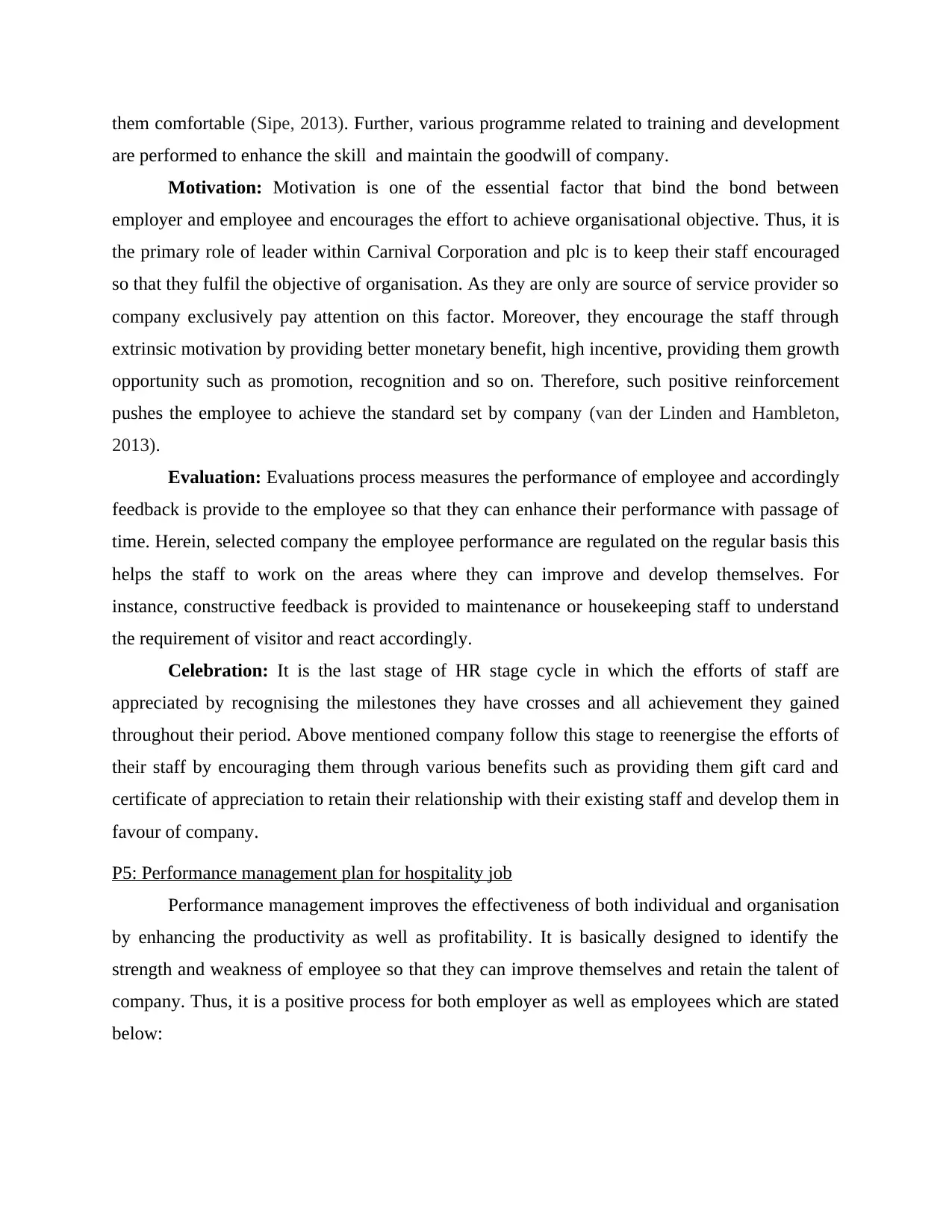
them comfortable (Sipe, 2013). Further, various programme related to training and development
are performed to enhance the skill and maintain the goodwill of company.
Motivation: Motivation is one of the essential factor that bind the bond between
employer and employee and encourages the effort to achieve organisational objective. Thus, it is
the primary role of leader within Carnival Corporation and plc is to keep their staff encouraged
so that they fulfil the objective of organisation. As they are only are source of service provider so
company exclusively pay attention on this factor. Moreover, they encourage the staff through
extrinsic motivation by providing better monetary benefit, high incentive, providing them growth
opportunity such as promotion, recognition and so on. Therefore, such positive reinforcement
pushes the employee to achieve the standard set by company (van der Linden and Hambleton,
2013).
Evaluation: Evaluations process measures the performance of employee and accordingly
feedback is provide to the employee so that they can enhance their performance with passage of
time. Herein, selected company the employee performance are regulated on the regular basis this
helps the staff to work on the areas where they can improve and develop themselves. For
instance, constructive feedback is provided to maintenance or housekeeping staff to understand
the requirement of visitor and react accordingly.
Celebration: It is the last stage of HR stage cycle in which the efforts of staff are
appreciated by recognising the milestones they have crosses and all achievement they gained
throughout their period. Above mentioned company follow this stage to reenergise the efforts of
their staff by encouraging them through various benefits such as providing them gift card and
certificate of appreciation to retain their relationship with their existing staff and develop them in
favour of company.
P5: Performance management plan for hospitality job
Performance management improves the effectiveness of both individual and organisation
by enhancing the productivity as well as profitability. It is basically designed to identify the
strength and weakness of employee so that they can improve themselves and retain the talent of
company. Thus, it is a positive process for both employer as well as employees which are stated
below:
are performed to enhance the skill and maintain the goodwill of company.
Motivation: Motivation is one of the essential factor that bind the bond between
employer and employee and encourages the effort to achieve organisational objective. Thus, it is
the primary role of leader within Carnival Corporation and plc is to keep their staff encouraged
so that they fulfil the objective of organisation. As they are only are source of service provider so
company exclusively pay attention on this factor. Moreover, they encourage the staff through
extrinsic motivation by providing better monetary benefit, high incentive, providing them growth
opportunity such as promotion, recognition and so on. Therefore, such positive reinforcement
pushes the employee to achieve the standard set by company (van der Linden and Hambleton,
2013).
Evaluation: Evaluations process measures the performance of employee and accordingly
feedback is provide to the employee so that they can enhance their performance with passage of
time. Herein, selected company the employee performance are regulated on the regular basis this
helps the staff to work on the areas where they can improve and develop themselves. For
instance, constructive feedback is provided to maintenance or housekeeping staff to understand
the requirement of visitor and react accordingly.
Celebration: It is the last stage of HR stage cycle in which the efforts of staff are
appreciated by recognising the milestones they have crosses and all achievement they gained
throughout their period. Above mentioned company follow this stage to reenergise the efforts of
their staff by encouraging them through various benefits such as providing them gift card and
certificate of appreciation to retain their relationship with their existing staff and develop them in
favour of company.
P5: Performance management plan for hospitality job
Performance management improves the effectiveness of both individual and organisation
by enhancing the productivity as well as profitability. It is basically designed to identify the
strength and weakness of employee so that they can improve themselves and retain the talent of
company. Thus, it is a positive process for both employer as well as employees which are stated
below:
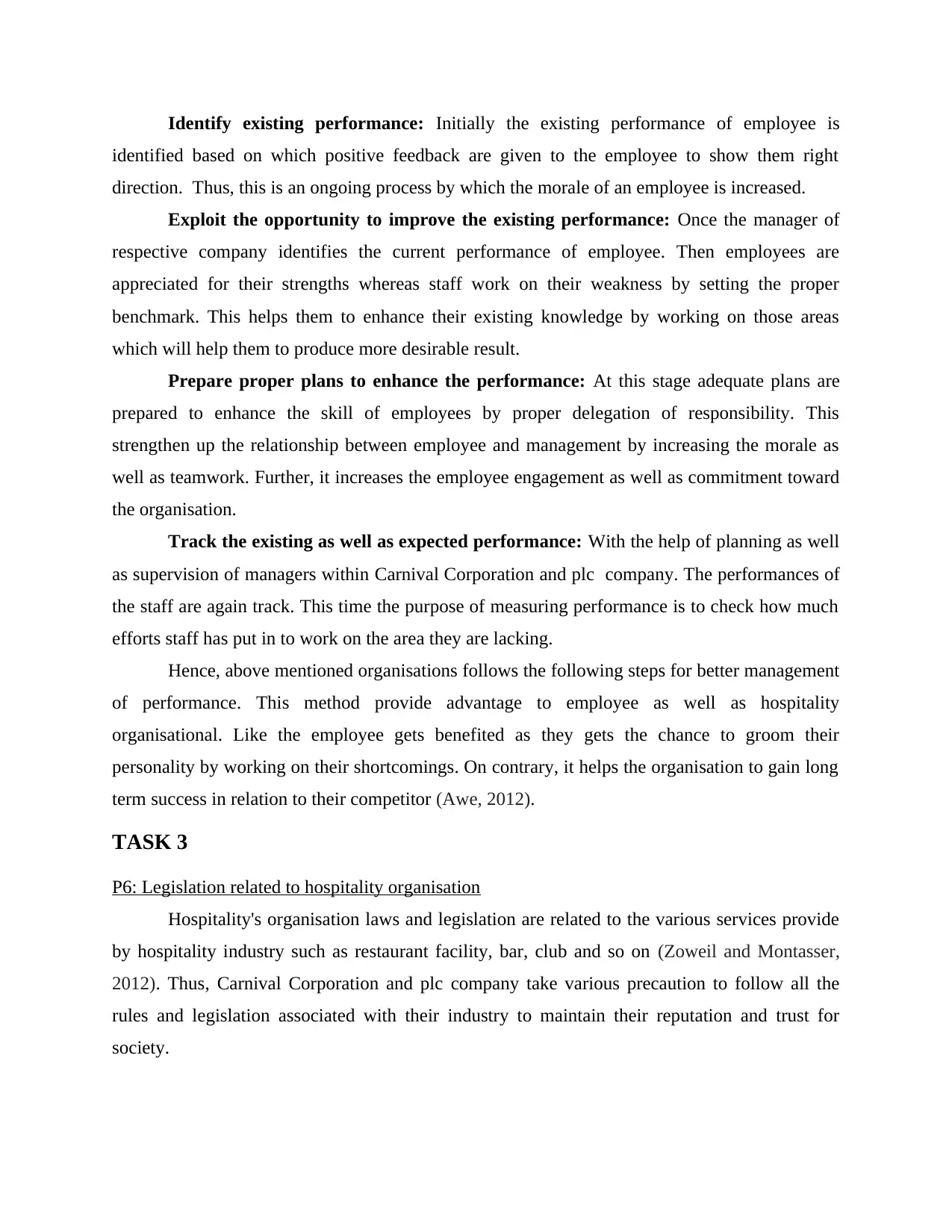
Identify existing performance: Initially the existing performance of employee is
identified based on which positive feedback are given to the employee to show them right
direction. Thus, this is an ongoing process by which the morale of an employee is increased.
Exploit the opportunity to improve the existing performance: Once the manager of
respective company identifies the current performance of employee. Then employees are
appreciated for their strengths whereas staff work on their weakness by setting the proper
benchmark. This helps them to enhance their existing knowledge by working on those areas
which will help them to produce more desirable result.
Prepare proper plans to enhance the performance: At this stage adequate plans are
prepared to enhance the skill of employees by proper delegation of responsibility. This
strengthen up the relationship between employee and management by increasing the morale as
well as teamwork. Further, it increases the employee engagement as well as commitment toward
the organisation.
Track the existing as well as expected performance: With the help of planning as well
as supervision of managers within Carnival Corporation and plc company. The performances of
the staff are again track. This time the purpose of measuring performance is to check how much
efforts staff has put in to work on the area they are lacking.
Hence, above mentioned organisations follows the following steps for better management
of performance. This method provide advantage to employee as well as hospitality
organisational. Like the employee gets benefited as they gets the chance to groom their
personality by working on their shortcomings. On contrary, it helps the organisation to gain long
term success in relation to their competitor (Awe, 2012).
TASK 3
P6: Legislation related to hospitality organisation
Hospitality's organisation laws and legislation are related to the various services provide
by hospitality industry such as restaurant facility, bar, club and so on (Zoweil and Montasser,
2012). Thus, Carnival Corporation and plc company take various precaution to follow all the
rules and legislation associated with their industry to maintain their reputation and trust for
society.
identified based on which positive feedback are given to the employee to show them right
direction. Thus, this is an ongoing process by which the morale of an employee is increased.
Exploit the opportunity to improve the existing performance: Once the manager of
respective company identifies the current performance of employee. Then employees are
appreciated for their strengths whereas staff work on their weakness by setting the proper
benchmark. This helps them to enhance their existing knowledge by working on those areas
which will help them to produce more desirable result.
Prepare proper plans to enhance the performance: At this stage adequate plans are
prepared to enhance the skill of employees by proper delegation of responsibility. This
strengthen up the relationship between employee and management by increasing the morale as
well as teamwork. Further, it increases the employee engagement as well as commitment toward
the organisation.
Track the existing as well as expected performance: With the help of planning as well
as supervision of managers within Carnival Corporation and plc company. The performances of
the staff are again track. This time the purpose of measuring performance is to check how much
efforts staff has put in to work on the area they are lacking.
Hence, above mentioned organisations follows the following steps for better management
of performance. This method provide advantage to employee as well as hospitality
organisational. Like the employee gets benefited as they gets the chance to groom their
personality by working on their shortcomings. On contrary, it helps the organisation to gain long
term success in relation to their competitor (Awe, 2012).
TASK 3
P6: Legislation related to hospitality organisation
Hospitality's organisation laws and legislation are related to the various services provide
by hospitality industry such as restaurant facility, bar, club and so on (Zoweil and Montasser,
2012). Thus, Carnival Corporation and plc company take various precaution to follow all the
rules and legislation associated with their industry to maintain their reputation and trust for
society.
⊘ This is a preview!⊘
Do you want full access?
Subscribe today to unlock all pages.

Trusted by 1+ million students worldwide
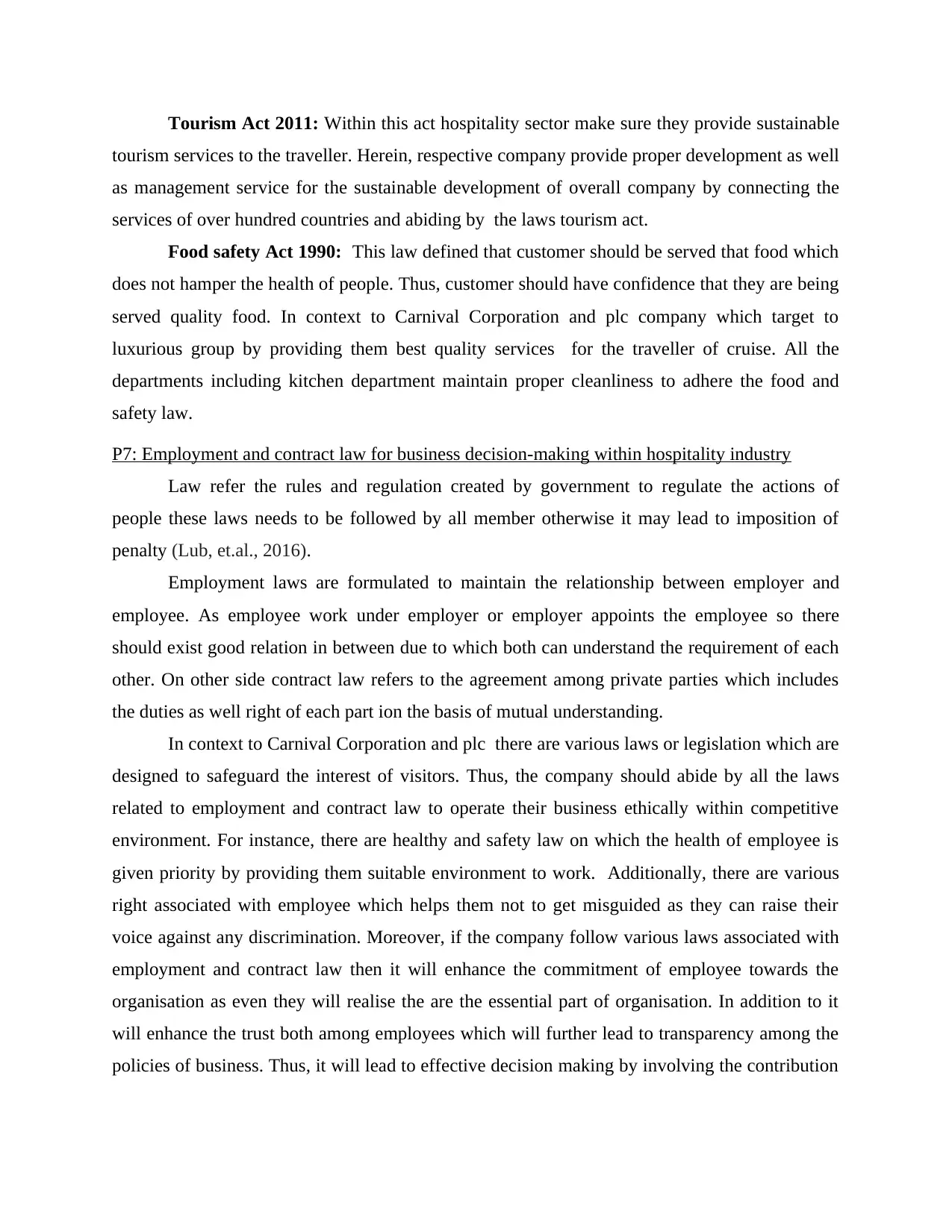
Tourism Act 2011: Within this act hospitality sector make sure they provide sustainable
tourism services to the traveller. Herein, respective company provide proper development as well
as management service for the sustainable development of overall company by connecting the
services of over hundred countries and abiding by the laws tourism act.
Food safety Act 1990: This law defined that customer should be served that food which
does not hamper the health of people. Thus, customer should have confidence that they are being
served quality food. In context to Carnival Corporation and plc company which target to
luxurious group by providing them best quality services for the traveller of cruise. All the
departments including kitchen department maintain proper cleanliness to adhere the food and
safety law.
P7: Employment and contract law for business decision-making within hospitality industry
Law refer the rules and regulation created by government to regulate the actions of
people these laws needs to be followed by all member otherwise it may lead to imposition of
penalty (Lub, et.al., 2016).
Employment laws are formulated to maintain the relationship between employer and
employee. As employee work under employer or employer appoints the employee so there
should exist good relation in between due to which both can understand the requirement of each
other. On other side contract law refers to the agreement among private parties which includes
the duties as well right of each part ion the basis of mutual understanding.
In context to Carnival Corporation and plc there are various laws or legislation which are
designed to safeguard the interest of visitors. Thus, the company should abide by all the laws
related to employment and contract law to operate their business ethically within competitive
environment. For instance, there are healthy and safety law on which the health of employee is
given priority by providing them suitable environment to work. Additionally, there are various
right associated with employee which helps them not to get misguided as they can raise their
voice against any discrimination. Moreover, if the company follow various laws associated with
employment and contract law then it will enhance the commitment of employee towards the
organisation as even they will realise the are the essential part of organisation. In addition to it
will enhance the trust both among employees which will further lead to transparency among the
policies of business. Thus, it will lead to effective decision making by involving the contribution
tourism services to the traveller. Herein, respective company provide proper development as well
as management service for the sustainable development of overall company by connecting the
services of over hundred countries and abiding by the laws tourism act.
Food safety Act 1990: This law defined that customer should be served that food which
does not hamper the health of people. Thus, customer should have confidence that they are being
served quality food. In context to Carnival Corporation and plc company which target to
luxurious group by providing them best quality services for the traveller of cruise. All the
departments including kitchen department maintain proper cleanliness to adhere the food and
safety law.
P7: Employment and contract law for business decision-making within hospitality industry
Law refer the rules and regulation created by government to regulate the actions of
people these laws needs to be followed by all member otherwise it may lead to imposition of
penalty (Lub, et.al., 2016).
Employment laws are formulated to maintain the relationship between employer and
employee. As employee work under employer or employer appoints the employee so there
should exist good relation in between due to which both can understand the requirement of each
other. On other side contract law refers to the agreement among private parties which includes
the duties as well right of each part ion the basis of mutual understanding.
In context to Carnival Corporation and plc there are various laws or legislation which are
designed to safeguard the interest of visitors. Thus, the company should abide by all the laws
related to employment and contract law to operate their business ethically within competitive
environment. For instance, there are healthy and safety law on which the health of employee is
given priority by providing them suitable environment to work. Additionally, there are various
right associated with employee which helps them not to get misguided as they can raise their
voice against any discrimination. Moreover, if the company follow various laws associated with
employment and contract law then it will enhance the commitment of employee towards the
organisation as even they will realise the are the essential part of organisation. In addition to it
will enhance the trust both among employees which will further lead to transparency among the
policies of business. Thus, it will lead to effective decision making by involving the contribution
Paraphrase This Document
Need a fresh take? Get an instant paraphrase of this document with our AI Paraphraser
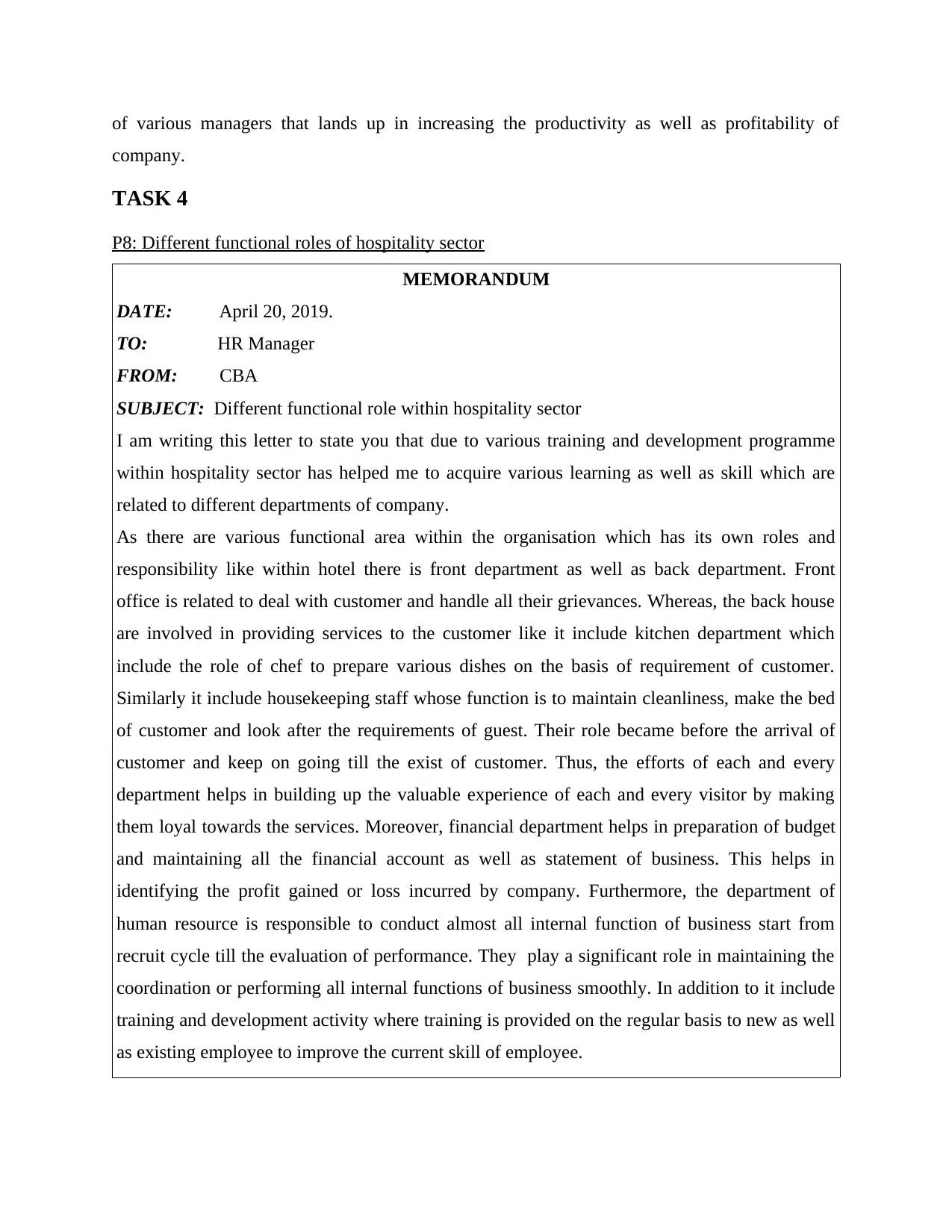
of various managers that lands up in increasing the productivity as well as profitability of
company.
TASK 4
P8: Different functional roles of hospitality sector
MEMORANDUM
DATE: April 20, 2019.
TO: HR Manager
FROM: CBA
SUBJECT: Different functional role within hospitality sector
I am writing this letter to state you that due to various training and development programme
within hospitality sector has helped me to acquire various learning as well as skill which are
related to different departments of company.
As there are various functional area within the organisation which has its own roles and
responsibility like within hotel there is front department as well as back department. Front
office is related to deal with customer and handle all their grievances. Whereas, the back house
are involved in providing services to the customer like it include kitchen department which
include the role of chef to prepare various dishes on the basis of requirement of customer.
Similarly it include housekeeping staff whose function is to maintain cleanliness, make the bed
of customer and look after the requirements of guest. Their role became before the arrival of
customer and keep on going till the exist of customer. Thus, the efforts of each and every
department helps in building up the valuable experience of each and every visitor by making
them loyal towards the services. Moreover, financial department helps in preparation of budget
and maintaining all the financial account as well as statement of business. This helps in
identifying the profit gained or loss incurred by company. Furthermore, the department of
human resource is responsible to conduct almost all internal function of business start from
recruit cycle till the evaluation of performance. They play a significant role in maintaining the
coordination or performing all internal functions of business smoothly. In addition to it include
training and development activity where training is provided on the regular basis to new as well
as existing employee to improve the current skill of employee.
company.
TASK 4
P8: Different functional roles of hospitality sector
MEMORANDUM
DATE: April 20, 2019.
TO: HR Manager
FROM: CBA
SUBJECT: Different functional role within hospitality sector
I am writing this letter to state you that due to various training and development programme
within hospitality sector has helped me to acquire various learning as well as skill which are
related to different departments of company.
As there are various functional area within the organisation which has its own roles and
responsibility like within hotel there is front department as well as back department. Front
office is related to deal with customer and handle all their grievances. Whereas, the back house
are involved in providing services to the customer like it include kitchen department which
include the role of chef to prepare various dishes on the basis of requirement of customer.
Similarly it include housekeeping staff whose function is to maintain cleanliness, make the bed
of customer and look after the requirements of guest. Their role became before the arrival of
customer and keep on going till the exist of customer. Thus, the efforts of each and every
department helps in building up the valuable experience of each and every visitor by making
them loyal towards the services. Moreover, financial department helps in preparation of budget
and maintaining all the financial account as well as statement of business. This helps in
identifying the profit gained or loss incurred by company. Furthermore, the department of
human resource is responsible to conduct almost all internal function of business start from
recruit cycle till the evaluation of performance. They play a significant role in maintaining the
coordination or performing all internal functions of business smoothly. In addition to it include
training and development activity where training is provided on the regular basis to new as well
as existing employee to improve the current skill of employee.
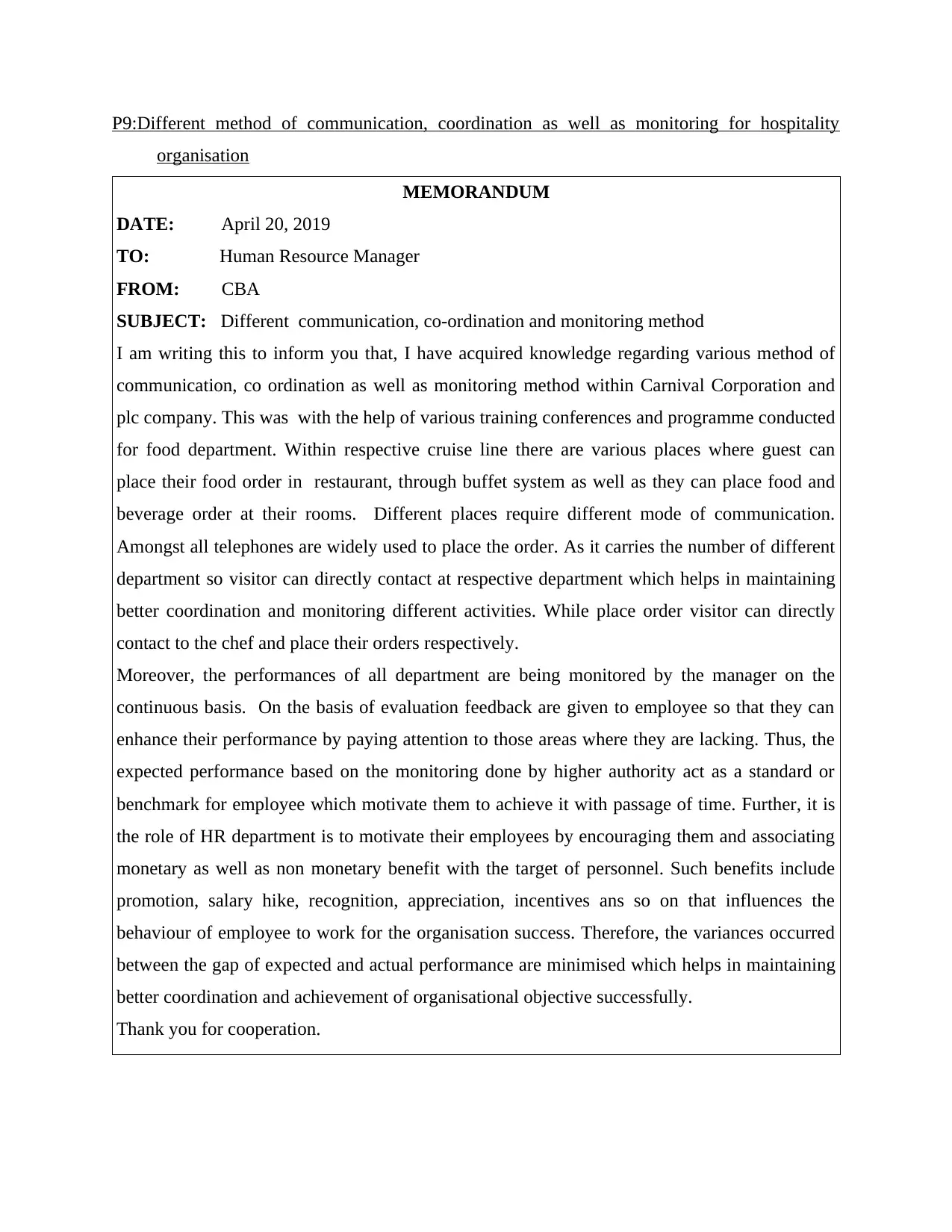
P9:Different method of communication, coordination as well as monitoring for hospitality
organisation
MEMORANDUM
DATE: April 20, 2019
TO: Human Resource Manager
FROM: CBA
SUBJECT: Different communication, co-ordination and monitoring method
I am writing this to inform you that, I have acquired knowledge regarding various method of
communication, co ordination as well as monitoring method within Carnival Corporation and
plc company. This was with the help of various training conferences and programme conducted
for food department. Within respective cruise line there are various places where guest can
place their food order in restaurant, through buffet system as well as they can place food and
beverage order at their rooms. Different places require different mode of communication.
Amongst all telephones are widely used to place the order. As it carries the number of different
department so visitor can directly contact at respective department which helps in maintaining
better coordination and monitoring different activities. While place order visitor can directly
contact to the chef and place their orders respectively.
Moreover, the performances of all department are being monitored by the manager on the
continuous basis. On the basis of evaluation feedback are given to employee so that they can
enhance their performance by paying attention to those areas where they are lacking. Thus, the
expected performance based on the monitoring done by higher authority act as a standard or
benchmark for employee which motivate them to achieve it with passage of time. Further, it is
the role of HR department is to motivate their employees by encouraging them and associating
monetary as well as non monetary benefit with the target of personnel. Such benefits include
promotion, salary hike, recognition, appreciation, incentives ans so on that influences the
behaviour of employee to work for the organisation success. Therefore, the variances occurred
between the gap of expected and actual performance are minimised which helps in maintaining
better coordination and achievement of organisational objective successfully.
Thank you for cooperation.
organisation
MEMORANDUM
DATE: April 20, 2019
TO: Human Resource Manager
FROM: CBA
SUBJECT: Different communication, co-ordination and monitoring method
I am writing this to inform you that, I have acquired knowledge regarding various method of
communication, co ordination as well as monitoring method within Carnival Corporation and
plc company. This was with the help of various training conferences and programme conducted
for food department. Within respective cruise line there are various places where guest can
place their food order in restaurant, through buffet system as well as they can place food and
beverage order at their rooms. Different places require different mode of communication.
Amongst all telephones are widely used to place the order. As it carries the number of different
department so visitor can directly contact at respective department which helps in maintaining
better coordination and monitoring different activities. While place order visitor can directly
contact to the chef and place their orders respectively.
Moreover, the performances of all department are being monitored by the manager on the
continuous basis. On the basis of evaluation feedback are given to employee so that they can
enhance their performance by paying attention to those areas where they are lacking. Thus, the
expected performance based on the monitoring done by higher authority act as a standard or
benchmark for employee which motivate them to achieve it with passage of time. Further, it is
the role of HR department is to motivate their employees by encouraging them and associating
monetary as well as non monetary benefit with the target of personnel. Such benefits include
promotion, salary hike, recognition, appreciation, incentives ans so on that influences the
behaviour of employee to work for the organisation success. Therefore, the variances occurred
between the gap of expected and actual performance are minimised which helps in maintaining
better coordination and achievement of organisational objective successfully.
Thank you for cooperation.
⊘ This is a preview!⊘
Do you want full access?
Subscribe today to unlock all pages.

Trusted by 1+ million students worldwide
1 out of 13
Related Documents
Your All-in-One AI-Powered Toolkit for Academic Success.
+13062052269
info@desklib.com
Available 24*7 on WhatsApp / Email
![[object Object]](/_next/static/media/star-bottom.7253800d.svg)
Unlock your academic potential
Copyright © 2020–2026 A2Z Services. All Rights Reserved. Developed and managed by ZUCOL.





